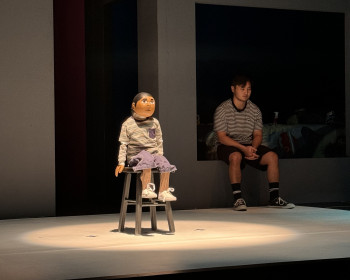Students establish the “taste of place” through natural wine in France
Open gallery

During the summer, Lewis & Clark students continue to work hard in their fields of study. By collaborating with faculty on research projects, students are able to engage their curiosity, expand their learning, and prepare for life after college, all while making meaningful contributions to scholarship.
McKenzie Phelan ’14 and Andrew Reetz ’14 are working with Assistant Professor of Foreign Languages Philippe Brand and Associate Professor of Anthropology Deborah Heath to study the natural wine movement in France. Their work has taken them all over the world and taught them how to investigate “terroir,” or the “taste of place.” In the following Q&A, the team members reflect on their experience.
What are you researching? What question or problem are you trying to answer/solve with your research?
What is natural wine? How is it produced? How is it marketed? How has the production of wine changed over time and how does it exist today in a globalized market? These are among the most important questions we are asking in our interviews as we investigate terroir, the “taste of place,” and the growing effort to produce natural wine on an international level in the name of sustainability and human health. Our work in France, Italy, Oregon, and allied regions aims to better understand the complexity of this globalized natural food industry.
Does your research have any potential applications in the real world, or will it influence other work in your field?
The discussion of natural wine finds its place in the broader discourses of alternative agriculture. With increasing attention paid to labels like organic, sustainable, fair trade, or local, natural wine has discovered a way to join the market. While our project investigates the production of natural wine, it also explores how it is being marketed and by whom it is purchased. Our project can be of particular interest to the greater Pacific Northwest community, as we live in a rich viticulture region. In Portland, there exists a premium on quality food that is responsibly sourced and expertly prepared. With wine being such a traditional counterpart to any dining experience, natural wine is a fitting addition to a large number of Portland establishments.
Is any of your research taking place off campus? If so, what’s that experience like?
We each spent time over the course of this past year in Paris, Alsace, and Angers, conducting interviews with natural and conventional winemakers, wine shop owners, and other wine affiliates. Under the direction of Deborah and Philippe, our work led us to discover uncharted reaches of the natural wine industry while testing our French language abilities. We also conducted interviews with some of natural wine’s most renowned figures in France. These opportunities taught us a great deal, however they also illuminated just how vast a field the wine industry is and how much more there is to explore.
What first sparked your interest in this research area?
Phelan: I was first exposed to French culture at the age of 17 when I studied abroad for a year in the north of France before starting my undergraduate studies. I was enthralled by the architecture, the countryside, and the reverence for quality food and drink: la cuisine française. Upon my return to the U.S., I worked for a year in a fromagerie—a cheese shop—and then as a pastry chef in a pâtisserie. I then integrated my interest in gastronomy and food studies with my academic pursuits. I have focused on alternative agriculture in my environmental studies curriculum and submitted my concentration proposal on biodynamic wine in fall 2012.
Reetz: I came to Lewis & Clark with the intention of becoming an environmental studies major, yet quickly found a calling for the human sciences as a sociology and anthropology major instead. Having had French classes for more than a decade, I’ve become nearly fluent, leading me to study for a full year through Lewis & Clark in Nancy, France. While I was there, I first began engaging with natural wine thanks to an invitation from Deborah to attend the International Biodynamic Wine Conference in Colmar, Alsace.
How has working closely with faculty influenced your education?
The opportunity to work with these professors has impacted our lives both academically and personally. From an academic standpoint, we have learned how a liberal arts background can enable one to study a wide variety of topics. On a personal level, it has been an honor getting to know them both for their passions outside of their respective fields. In Paris, we had the pleasure of learning from both of them how they integrate their interests into their professional pursuits. Our collaboration on this research project has yielded true friendships with our professors. We have been afforded a special opportunity to learn from their wisdom and experience that differs from the traditional classroom transmission of information. Instead, we’ve learned from their personal stories, jokes, and advice.
How do you hope your experiences this summer will impact your future studies or professional pursuits?
Phelan: I know that I want to work in the food or wine industry, hopefully with opportunities of international employment. This research project has helped me uncover specific programs of study and employment that I will pursue. First, I hope to apply for a Fulbright scholarship in order to continue this research in France for a full academic year. It would be an invaluable opportunity to gain more experience in the industry for which I intend to seek employment. After that I will apply to the International Vintage Master program offered by École Supérieure d’Agriculture.
Reetz: The natural environment fascinates me, and I hope to more closely associate myself with the production of natural wine in an effort to gain experience at the intersection between nature and the human intervention, which is evident in wine production. I may pursue a career in the international food industry, either through a master’s degree in cultural anthropology or as a specialist in French gastronomy. This project’s interdisciplinary nature opens up a host of opportunities for me as a student of French language and culture that may one day reach across the globe.
About the program
Both Phelan and Reetz received partial funding for their travels from the Student Academic Affairs Board (SAAB). The SAAB board, made up of one representative from each academic discipline and part of the Associated Students of Lewis & Clark, meets weekly to review applications for grants. SAAB awards funds to student motivated research, attendance at conferences, visiting scholar programs, and performances or artistic displays.
The research team also received funding from a Mellon Foundation grant for environmental sciences. The Mellon grant provides funds to help faculty infuse collaborative research into a broad range of new and existing courses, and supports an increased number of student-faculty summer research projects.
“We firmly believe that engaging students in the practice of their discipline is the best way to prepare them for life beyond the college,” said Tuajuanda Jordan, dean of the College of Arts and Sciences. “Student-faculty research is seen as one of the strengths of our educational experience, and with this grant we can ensure that students have access to this type of opportunity.”
With this support, The Andrew W. Mellon Foundation continues its long legacy of supporting and enriching the arts and humanities at Lewis & Clark.
Department of Sociology and Anthropology
Zibby Pillote ’14 contributed to this story.
Public Relations is located in McAfee on the Undergraduate Campus.
MSC: 19
email public@lclark.edu
voice 503-768-7970
Public Relations
Lewis & Clark
615 S. Palatine Hill Road MSC 19
Portland OR 97219

